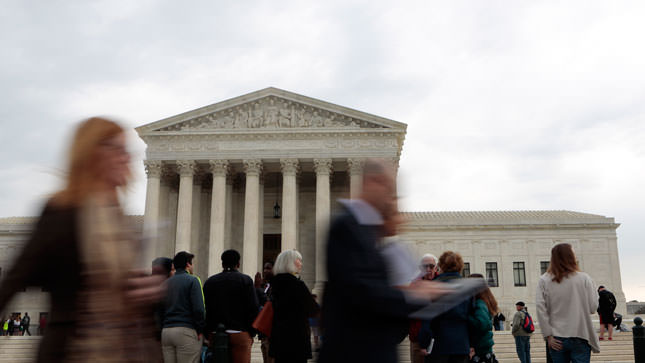The Supreme Court on Wednesday handed a defeat to businesses, ruling that they cannot stop a class-action lawsuit by offering to pay the full amount sought by the original plaintiff.
In a 6-3 decision, the Supreme Court sided against advertising firm Campbell Ewald that was trying to avoid a class-action lawsuit.
ADVERTISEMENT
“An unaccepted settlement offer or offer of judgment does not moot a plaintiff’s case,” Ginsburg wrote.
The case stems from the nationwide class action lawsuit Jose Gomez brought against the Detroit-based Campbell Ewald Co., which was hired by the U.S. Navy to develop a multimedia recruiting campaign that included sending text messages to young adults who consented to receiving messages about Navy service.
Campbell’s subcontractor, Mindmatics LLC, generated a list of cellular phone numbers for consenting 18- to 24-year-olds and then sent messages to over 100,000 recipients, including Gomez, who at 40 years old argued he was not in the company’s target demographic and had not consented to receiving messages.
Gomez argued that Campbell-Ewald had violated the Telephone Consumer Protection Act (TCPA), which prohibits using any automatic dialing system to send a text message to a cellular phone without the recipient’s prior consent.
The district court ruled that the case was moot because Campbell Ewald had offered Gomez a settlement and held that by acting on the Navy’s behalf, the company was immune from class-action suits.
The Ninth Circuit ruled that Campbell-Ewald was not entitled to “derivative sovereign immunity,” reversing the lower court’s decision that rendered the case moot. The Supreme Court affirmed the Ninth Circuit’s decision Wednesday and remanded the case back to the lower courts.
“We do not overlook that subcontractor Mindmatics, not Campbell, dispatched the Navy’s recruiting message to unconsenting recipients,” Ginsburg wrote in her decision. “But the Federal Communications Commission has ruled that, under federal common law principles of agency, there is vicarious liability for TCPA violations.”
Chief Justice John Roberts filed a dissenting opinion on which Justices Antonin Scalia and Samuel Alito joined, stating the court correctly concluded that an offer to complete relief on a claim does not render that claim moot, failing to advance a sound basis for its conclusion.
Source: thehill.com





Be the first to comment on "Supreme Court Deals Defeat to Business on Class-Action Suits"